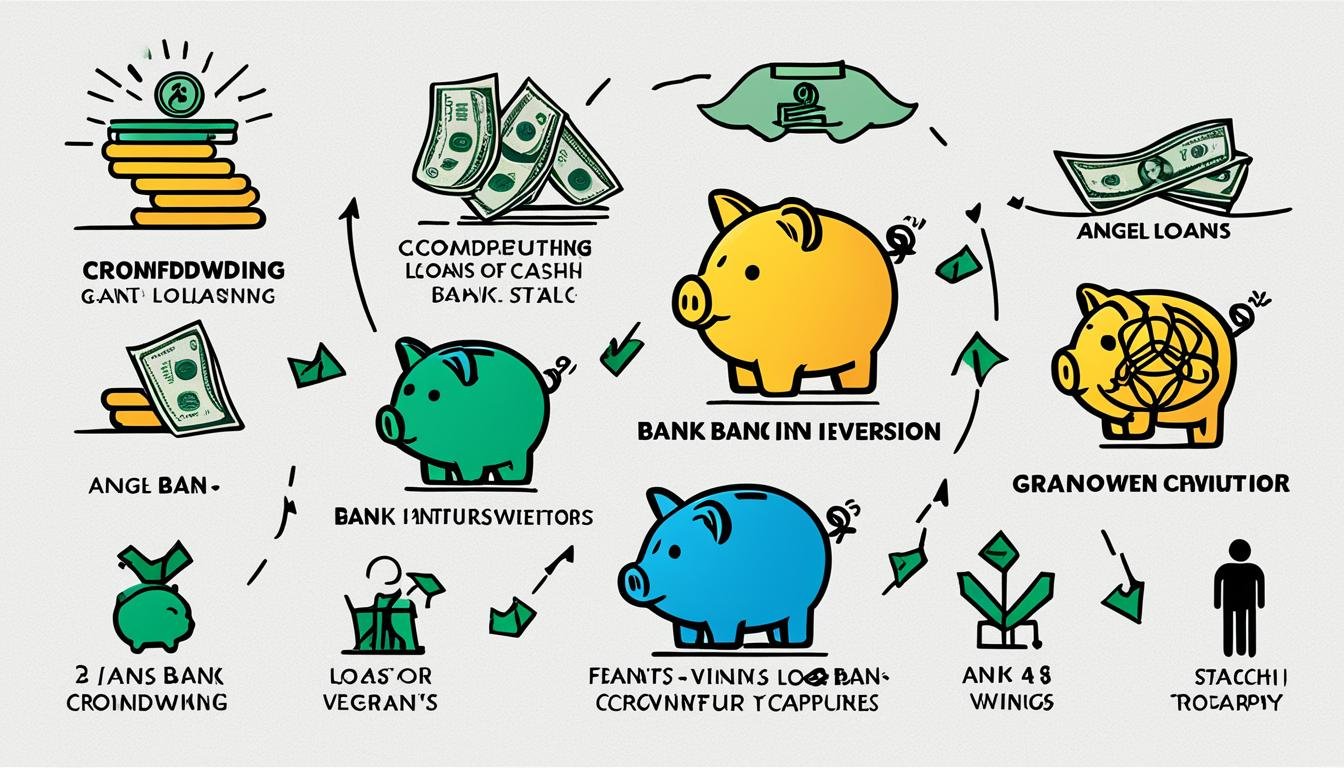Mastering Entrepreneurial Finance Essentials
Entrepreneurial finance is a critical aspect of running a successful business. In this article, we will explore the essentials of entrepreneurial finance and how mastering it can benefit small business owners. We will cover various financing options, such as venture capital investments, angel investors, crowdfunding for entrepreneurs, business loans for startups, and equity financing for entrepreneurs. By understanding and utilizing these funding sources, entrepreneurs can propel their startups to success.
Key Takeaways:
- Entrepreneurial finance is crucial for small business owners to secure funding and drive long-term growth.
- Mastering entrepreneurial finance provides the necessary knowledge and skills to successfully manage the financial aspects of a business.
- Costa Consultants offers an 18-week entrepreneurial finance course that equips small business owners with the tools they need to navigate the world of finance.
- The course covers various financial aspects, including business accounting, cash flow management, taxation, profitability, resource allocation, re-investment strategies, and company valuation.
- By enrolling in the course, small business owners gain the confidence and skills to tackle the financial challenges of their ventures.
Why Mastering Entrepreneurial Finance is Crucial for Small Business Owners
Proper financial accounting management is vital for small business owners. It allows you to make informed decisions, ensure profitability, secure funding, and drive long-term growth. Without a solid understanding of entrepreneurial finance, you may struggle to navigate the financial aspects of your business and miss out on crucial opportunities. Mastering entrepreneurial finance provides the necessary knowledge and skills to successfully manage the financial aspects of your business.
By having a deep understanding of financial accounting management, you can analyze and interpret financial data accurately. This enables you to make informed decisions based on real-time insights and trends. Whether it’s determining the profitability of new products or assessing the viability of strategic investments, your financial acumen will guide you towards the best possible outcome.
Furthermore, mastering entrepreneurial finance helps you secure funding for your business. Whether you’re seeking loans, attracting investors, or exploring alternative financing options, having a solid understanding of financial principles and practices gives you an advantage. Lenders and investors want to see that you have a clear understanding of your financial standing, projected revenues, and potential returns on investment. With a strong grasp of entrepreneurial finance, you can confidently present your business case and secure the funding you need for growth.
In addition to making informed decisions and securing funding, mastering entrepreneurial finance also sets the foundation for long-term growth. By effectively managing your financial resources, allocating budgets, and optimizing cash flow, you can ensure the sustainability and profitability of your business. Understanding financial metrics, such as profitability ratios and return on investment, empowers you to drive growth strategies that capitalize on your strengths and opportunities.
Benefits of Mastering Entrepreneurial Finance:
- Make informed decisions based on accurate financial data.
- Secure funding from lenders and investors.
- Optimize cash flow and ensure financial stability.
- Drive long-term growth strategies.
With a strong foundation in entrepreneurial finance, you can navigate the complex financial landscape of running a small business with confidence and competence.
Remember, financial accounting management isn’t just about crunching numbers; it’s about understanding the story behind the numbers and using that knowledge to inform your business decisions.
| Reasons Why Mastering Entrepreneurial Finance Matters | Benefits for Small Business Owners |
|---|---|
| Make informed decisions | Ensure profitability |
| Secure funding | Drive long-term growth |
| Navigate the financial landscape with confidence | Optimize cash flow |
The Costa Consultants 18-Week Entrepreneurial Finance Course
Costa Consultants offers a comprehensive 18-week entrepreneurial finance course specifically designed for small business owners. Led by expert instructor Kathryn Gordon, MBA, this course equips entrepreneurs with the knowledge and tools necessary to navigate the intricate world of entrepreneurial finance.
Throughout the program, participants will gain valuable insights into various financial aspects critical to running a successful business. Topics covered include business accounting, cash flow management, taxation, profitability analysis, resource allocation, re-investment strategies, and company valuation. By the end of the course, small business owners will have the confidence and skills needed to effectively tackle the financial challenges and opportunities that arise within their ventures.
Under Kathryn Gordon’s expert guidance, you will learn the foundations of entrepreneurial finance and acquire practical skills that you can immediately apply to your business. Whether you’re a seasoned small business owner or just starting out, this course provides the essential knowledge to make informed financial decisions and drive the success of your enterprise.
Course Highlights
- Expert-led instruction by Kathryn Gordon, MBA
- In-depth coverage of key financial aspects
- Practical application and real-world case studies
- Interactive learning environment
- Networking opportunities with fellow entrepreneurs
- Access to valuable tools and resources
“The entrepreneurial finance course offered by Costa Consultants has been a game-changer for my business. I now have a solid understanding of financial concepts and strategies that have helped me make informed decisions, manage cash flow effectively, and drive long-term growth. I highly recommend this course to any small business owner looking to take control of their financial success.” – Sarah Johnson, Founder of XYZ Bakery
Don’t miss out on the opportunity to gain the knowledge and skills necessary for financial success as a small business owner. Enroll in the Costa Consultants 18-week entrepreneurial finance course today and pave the way for a financially sustainable future for your business.
Week 1-2: Introduction to Entrepreneurial Finance
In the first two weeks of the Costa Consultants 18-week entrepreneurial finance course, you will embark on a journey to understand the critical foundations of entrepreneurial finance. This section will provide you with a deep insight into the pivotal role that finance plays in entrepreneurship, enabling you to identify key financial challenges and opportunities that can impact your business.
Entrepreneurial finance is not just about numbers and balance sheets; it requires a unique mindset and a comprehensive understanding of how financial decisions shape the success of your venture. By cultivating a strong financial mindset, you will be equipped to make informed decisions that drive your business forward.
Throughout this section, expert instructor Kathryn Gordon, MBA, will guide you through the fundamentals of entrepreneurial finance, covering topics such as:
- The significance of finance in entrepreneurship
- Identification of common financial challenges faced by small business owners
- Identification of key financial opportunities to maximize your business growth
- The development of a financial mindset that aligns with your entrepreneurial goals
By the end of this section, you will have a strong foundation in entrepreneurial finance and the ability to approach financial challenges and opportunities with confidence and strategic thinking.
“The right financial mindset is essential for any entrepreneur. It enables you to see beyond the numbers and make informed decisions that drive your business towards success.”
| Key Takeaways: |
|
|---|
Week 3-4: Crafting a Business Plan
Building a robust business plan is crucial for the success of a startup. In weeks three and four of the course, you will explore the various elements that constitute a comprehensive business plan. By crafting a well-thought-out plan, you lay the foundation for your business’s future success.
Your business plan serves as a roadmap, guiding your decisions and actions as you navigate the entrepreneurial journey. It outlines your business idea, goals, strategies, and financial projections and provides a framework for evaluating the feasibility of your venture.
Crafting a Business Plan:
- Identifying and articulating your business idea
- Conducting market research and competitor analysis
- Defining your target audience and creating a marketing plan
- Outlining your product or service offerings
- Developing a pricing strategy
- Formulating a financial plan with realistic projections
- Anticipating and addressing potential risks and challenges
During this phase, you will delve into financial projections and forecasting techniques to assess the financial viability of your business idea. By analyzing the market, competition, and demand, you can make informed decisions about the feasibility of your venture.
To visually showcase the importance of crafting a business plan, here is an illustrative table:
| Benefit | Explanation |
|---|---|
| Guidance | A business plan provides a roadmap, guiding your decisions and actions. |
| Investor Confidence | A well-crafted business plan inspires confidence in potential investors. |
| Feasibility Assessment | Financial projections help evaluate the feasibility of your business idea. |
| Strategic Alignment | A business plan ensures that your goals and strategies are aligned with your vision. |
By dedicating time and effort to crafting a comprehensive business plan, you set your entrepreneurial journey on the path of success. Keep in mind the financial projections and feasibility assessment to make strategic decisions that propel your business forward.
Week 5-6: Business Accounting Fundamentals
To effectively manage your business’s finances, it is crucial to have a strong grasp of the basics of accounting. In weeks five and six of the course, we will dive into Business Accounting Fundamentals, equipping you with essential knowledge and skills.
Financial Statements
Understanding financial statements is key to gaining insights into your business’s financial health. During these weeks, you will learn how to interpret and analyze the three fundamental financial statements:
- Income statement
- Balance sheet
- Cash flow statement
By examining these statements, you will be able to assess your business’s profitability, liquidity, and overall financial performance.
Fundamentals of Accounting
Building a strong foundation in accounting is vital for making informed financial decisions. We will cover the following essential concepts:
- Double-entry accounting: Understand the principles behind the recording and balancing of financial transactions.
- Chart of accounts: Learn how to set up a chart of accounts that organizes your company’s financial activities.
- Journal entries: Master the art of recording financial transactions accurately.
- General ledger: Discover how the general ledger acts as the central record-keeping system for your business’s financial transactions.
Financial Reporting and Analysis
Being able to communicate your business’s financial performance effectively is essential. You will gain knowledge on:
- Financial ratios: Learn how to calculate and interpret key financial ratios that provide insights into your business’s liquidity, profitability, and efficiency.
- Financial analysis techniques: Understand how to analyze financial data and use it to make informed decisions for your business.
By mastering these Business Accounting Fundamentals, you will be equipped with the necessary skills to create accurate financial statements, analyze your business’s financial performance, and make informed decisions that contribute to the overall success of your business.
| Income Statement | Balance Sheet | Cash Flow Statement | |
|---|---|---|---|
| Description | Presents the revenue, expenses, and profit or loss of your business over a specific period. | Provides an overview of your business’s financial position by listing its assets, liabilities, and shareholders’ equity at a given point in time. | Shows the inflows and outflows of cash and cash equivalents, providing insights into the liquidity and operating activities of your business. |
| Purpose | To assess your business’s profitability and performance. | To understand your business’s financial health and solvency. | To evaluate your business’s cash flow and liquidity. |
| Key Components | Revenue, expenses, net income. | Assets, liabilities, shareholders’ equity. | Cash flows from operating, investing, and financing activities. |
Week 7-8: Cash Flow Management
Cash flow is the lifeblood of any business. It determines the financial health and stability of a company. In weeks seven and eight of the course, you will gain a deep understanding of the paramount importance of effective cash flow management. This knowledge is vital for ensuring the long-term success and sustainability of your business.
You will learn how to create cash flow statements, which act as early warning systems for potential financial challenges. These statements provide valuable insights into the inflows and outflows of cash within your business, helping you identify areas of improvement and make informed decisions.
Cash flow management also entails budgeting, a crucial aspect of financial health. By creating a detailed budget, you can allocate resources efficiently, monitor expenses, and plan for future growth. This ensures that your business operates within its means and maintains a positive cash flow position.
Understanding and mastering cash flow management is essential for the financial well-being of your business. It enables you to anticipate and overcome financial challenges, make strategic decisions, and ensure a healthy bottom line.
Week 9-10: Taxation in Entrepreneurship
Taxation plays a crucial role in the success of any business. In weeks nine and ten of the course, you will gain valuable insights into the impact of taxation on different business structures. Understanding the tax implications of your chosen structure is vital to effectively plan and manage your business’s finances.
During this phase, you will explore various tax planning strategies, enabling you to minimize your tax burden while ensuring compliance with legal regulations. Strategic tax planning can make a significant difference in the financial health and profitability of your business.
One key aspect that will be emphasized is the importance of compliance and record-keeping. Maintaining accurate and comprehensive records helps ensure smooth tax operations and minimizes the possibility of audits or penalties. It also provides you with a clear financial picture, enabling you to make informed decisions regarding your business.
Tax Planning Strategies:
1. Efficiently utilizing deductions and credits to lower taxable income.
2. Taking advantage of tax deferrals to defer tax payments to a later date.
3. Utilizing tax-efficient investment strategies to optimize returns.
4. Exploring tax-exempt investment options.
5. Evaluating the benefits of incorporating your business for potential tax savings.
By mastering tax planning, compliance, and record-keeping, you will have the necessary tools to navigate the complexities of taxation in entrepreneurship and maximize your financial benefits.
| Tax Planning Benefits | Record-keeping Practices | Compliance Strategies |
|---|---|---|
| Minimize tax liabilities | Maintain organized financial records | Stay updated with tax laws and regulations |
| Optimize tax deductions and credits | Track income and expenses accurately | Fulfill reporting and filing obligations |
| Increase cash flow for business growth | Keep receipts and relevant documentation | Implement internal controls for compliance |
| Enhance profitability | Use accounting software for efficient record-keeping | Seek professional tax advice when needed |
Week 11-12: Profitability and Resource Allocation
In weeks eleven and twelve of the course, you will dive deep into analyzing profitability ratios, explore effective pricing strategies, and learn how to control costs. These skills are essential for the core of every business – profitability. By understanding and mastering these concepts, you will ensure your business remains competitive and profitable in a dynamic market.
Analyzing Profitability Ratios
During this period, you will learn how to analyze profitability ratios to assess the financial performance of your business. Profitability ratios reveal important insights into the efficiency and effectiveness of your operations, helping you make informed decisions to improve profitability. By understanding these ratios, such as gross profit margin, net profit margin, and return on investment, you will have the tools to evaluate your business’s financial health.
Exploring Effective Pricing Strategies
Pricing is a critical element in maximizing profitability. In these weeks, you will explore various pricing strategies and their impact on your business’s revenue and profitability. By understanding concepts such as cost-based pricing, value-based pricing, and competitive pricing, you will be equipped to set optimal prices for your products or services. Effective pricing strategies can help you attract customers, increase sales, and enhance profitability.
Mastering Cost Control
Controlling costs is crucial for maintaining profitability. In this module, you will learn how to identify and manage costs effectively. You will explore techniques for cost control, such as cost analysis, cost reduction strategies, and cost allocation methods. By mastering cost control, you can optimize your resources, reduce waste, and improve overall profitability.
By the end of weeks eleven and twelve, you will have developed the skills necessary to analyze profitability ratios, implement effective pricing strategies, and control costs. These capabilities are vital for resource allocation and ensuring the long-term success and profitability of your business.
Week 13-14: Re-Investment Strategies
Reinvestment is key to achieving long-term growth and reaching your financial goals as a business owner. During weeks thirteen and fourteen of the course, you will gain valuable insights and guidance on successful reinvestment strategies. These strategies will empower you to make informed decisions, striking a balance between your short-term and long-term financial objectives.
Exploring Case Studies
One of the effective ways to learn is by studying real-life examples. In this section, you will delve into case studies of businesses that have implemented successful reinvestment strategies. By analyzing their approaches and outcomes, you’ll gain practical knowledge that can be applied to your own business. These case studies will serve as a source of inspiration and provide valuable insights into the best practices for reinvesting profits.
Maximizing Long-Term Growth
When it comes to reinvestment, it’s important to have a comprehensive understanding of your long-term goals. During these two weeks, you will learn techniques to identify and prioritize your business’s long-term growth prospects. By aligning your reinvestment strategies with these goals, you can optimize your chances of achieving sustainable success.
“Reinvestment is not just about spending money; it’s about strategically allocating resources to foster growth and create value.”
By evaluating different avenues for reinvestment, such as research and development, marketing, infrastructure, or talent acquisition, you will develop a tailored approach that supports your long-term growth objectives.
To reinforce your learning, the course will provide interactive exercises and collaborative discussions to help you apply the concepts from the case studies and develop a solid reinvestment strategy tailored to your unique business needs.
Week 15-16: Final Project and Business Plan Review
In weeks fifteen and sixteen of the course, you will have the opportunity to apply your newfound knowledge by developing a comprehensive financial plan for your own business. This final project serves as a culmination of everything you have learned throughout the Costa Consultants 18-week entrepreneurial finance course. By creating a well-crafted financial plan, you will gain a deeper understanding of your business’s financial landscape and develop strategies to achieve your financial goals.
During this phase, you will receive valuable feedback from both your peers and the expert instructor, Kathryn Gordon, MBA. Peer feedback offers a fresh perspective and allows you to gain insights from fellow entrepreneurs who are also navigating the complexities of entrepreneurial finance. Meanwhile, instructor feedback ensures that your business plan aligns with the financial strategies and goals discussed in previous weeks, providing you with valuable guidance for improvement.
Throughout the final project and business plan review, you will have the opportunity to refine your financial plan based on the feedback received. This iterative process ensures that your plan is thorough, realistic, and tailored to your unique business needs. By the end of this exercise, you will have a robust financial plan that serves as a roadmap for your business’s future success.
Benefits of the Final Project and Business Plan Review:
- Apply theoretical knowledge to real-world scenarios
- Develop a comprehensive financial plan for your business
- Receive valuable peer and instructor feedback
- Refine and improve your business plan based on feedback received
- Create a roadmap for your business’s financial success
Take a look at the table below for a breakdown of the final project and business plan review:
| Week | Activity |
|---|---|
| Week 15 | Developing the financial plan for your business |
| Week 16 | Peer and instructor feedback on your business plan |
Now, it’s time to put your entrepreneurial finance knowledge into action and create a strong financial plan that will guide your business towards success.
Conclusion
Mastering entrepreneurial finance is crucial for small business owners seeking financial success. It provides the knowledge and skills necessary to take control of your business’s financial future. By enrolling in the Costa Consultants 18-week entrepreneurial finance course, you gain access to a comprehensive program that covers various financial aspects and offers practical education and support.
Don’t let the complexities of finance hold you back from achieving your goals. With the right education and support, you can navigate the world of entrepreneurial finance confidently. By understanding concepts like business accounting, cash flow management, taxation, profitability, and resource allocation, you’ll be equipped to make informed decisions that contribute to the long-term growth and success of your small business.
Investing in your financial knowledge is an investment in your own success. Take charge of your business’s financial future and enroll in the Costa Consultants 18-week entrepreneurial finance course today. Empower yourself with the tools and skills needed to navigate the ever-changing landscape of entrepreneurial finance and achieve financial success as a small business owner.







